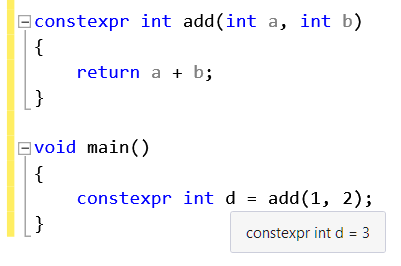Effective Modern C++:constexpr, thread safe
constexpr is more strict than const
int a;
const b = a;//correct
constexpr c = a;//wrong, because a has no value yet
When declaring a constexpr, it should be assigned with a already existed value.
you can get compile-time result when using constexpr function

Amazing, no debugging needed, when you are codding, you already know the result.
Thread safe programming
Use lock_guard to keep the whole function thread safe:
#include <iostream>
#include <mutex>
#include <thread>
using namespace std;
class busy
{
public:
void compute(int a)
{
lock_guard<mutex> guard(m);//keep safe here
cout << a <<" "<< curr << endl;
curr += 1.0;
}
private:
double curr = 3.0;
mutable mutex m;
};
busy bus;
void thread1()
{
for (int i = 0; i < 10; i++)
bus.compute(1);
}
void thread2()
{
for (int i = 0; i < 10; i++)
bus.compute(2);
}
void main()
{
thread t1(thread1);
thread2();
t1.join();
}
The mutex and lock_guard is used to keep the thread save.
If we don’t use mutex and lock_guard, everything will get crazy:
1 3
2 3
1 4
1 5
2 6
2 8
2 1 7
9
2 11
1 10
2 12
1 13
1 2 14
15
2 1 16
17
2 1 19
18
1 20
2 21
Using mutex and lock_guard, the output is like this:
1 3
1 4
1 5
1 6
1 7
1 8
1 9
1 10
1 11
1 12
2 13
2 14
2 15
2 16
2 17
2 18
2 19
2 20
2 21
2 22
Use atomic to keep a single variable thread safe:
mutable std::atomic<int> callCount{ 0 };
Just wrap the variable as above, it becomes thread safe.
